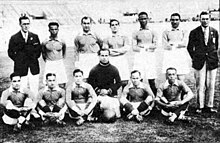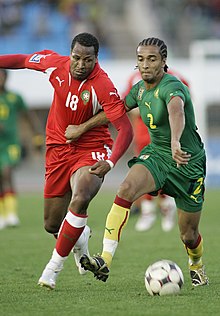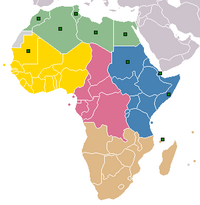Portal:Football in Africa
Introduction
Football is the most popular sport in Africa. Indeed, football is probably the most popular sport in every African country, although rugby and cricket are also very popular in South Africa. (Full article...)
This section may be unbalanced toward certain viewpoints. (October 2022) |

Selected article -

The Union of North African Football (UNAF; Arabic: اتحاد شمال إفريقيا لكرة القدم, romanized: Ittiḥād Shamāl Ifrīqyā li-Kurat al-Qadam; French: Union nord-africaine de football) is an association football organising body. It was launched in 2005 by the North African members of the Confederation of African Football (CAF), Algeria, Egypt, Libya, Morocco and Tunisia. The post of president will be rotated among the five founding nations.
Selected biography -
Eto'o scored over 100 goals in five seasons with Barcelona, and is also the record holder in number of appearances by an African player in La Liga. In 2010, he became the first player to win two European continental trebles following his back-to-back achievements with Barcelona and Inter Milan. He is the second player to have ever scored in two separate UEFA Champions League finals and the fourth player, after Marcel Desailly, Paulo Sousa, and Gerard Piqué, to have won the UEFA Champions League two years in a row with different teams. He is the most decorated African player of all time, having won the African Player of the Year award a record four times: in 2003, 2004, 2005, and 2010. He was third in the FIFA World Player of the Year award in 2005.
As a member of the Cameroon national team, Eto'o was a part of the squad that won the 2000 Olympic tournament. He has also participated in three World Cups and six Africa Cup of Nations (winning twice) and is the all-time leading scorer in the history of the Africa Cup of Nations, with 18 goals. He is also Cameroon's all-time leading scorer and third most capped player. He announced his retirement from international football on 27 August 2014.
Selected image -
| [[Image:|center|400px|A view of the FNB Stadium after a 2010 FIFA World Cup match]] |
A view of the FNB Stadium after the 2010 FIFA World Cup Group D match between Ghana and Germany on 23 June 2010. Nicknamed Soccer City and the Calabash, the stadium is the largest in Africa with a capacity of 94,736. It is the home ground of South African giants Kaizer Chiefs and the South Africa national team.
Subcategories
Related portals
More sports portals
WikiProjects
Related task forces and sub-projects
African football task force
WikiProject Africa • WikiProject Football
WikiProject Football task forces and sub-projects
 | |
| Wikipedia ads | file info – #250 |
Topics
Open tasks

- Expand stubs: Competitions in Africa • Organizations
- Expand club articles of teams from Africa.
- Expand biographies of Africans involved in football.
- Create: Requested articles • Most wanted football articles • Requested general football articles
- Add: Infoboxes • Images (General requests, Requested images of people)
- Review: articles currently under review
- Assess: Assessment requests • Assess an article
- Revert vandalism on this portal and on African football articles
- Assist in maintaining this portal and keeping its selected content up to date.
- WikiNews: Create and submit news stories about African football for Wikipedia's sister project WikiNews.
Associated Wikimedia
The following Wikimedia Foundation sister projects provide more on this subject:
-
Commons
Free media repository -
Wikibooks
Free textbooks and manuals -
Wikidata
Free knowledge base -
Wikinews
Free-content news -
Wikiquote
Collection of quotations -
Wikisource
Free-content library -
Wikiversity
Free learning tools -
Wiktionary
Dictionary and thesaurus
More portals
Sources

- ^ "The History Of Soccer In Africa". NPR.org. 2010-06-09. Retrieved 2016-03-31.
- ^ a b c Alegi, Peter (2010). African Soccerscapes. Ohio University Press. pp. 1–2. ISBN 9780896802780.
- ^ Frimpong, Enoch Darfah. "Ghana news: A world of superstition, frustration and disillusionment - Graphic Online". Retrieved 23 September 2017.
- ^ Lacey, Marc (8 August 2002). "Kangemi Journal; For Spellbinding Soccer, the Juju Man's on the Ball". The New York Times. NY Times. Retrieved 2016-03-31.
- ^ "World Cup Witchcraft: Africa Teams Turn to Magic for Aid". National Geographic. Archived from the original on July 10, 2006. Retrieved 2016-03-31.
- ^ Andy Mitten (September 2010). The Rough Guide to Cult Football. Rough Guides UK. ISBN 9781405387965. Retrieved 2016-04-02.
- ^ "African Nations Cup overshadowed by hocus pocus | Football". The Guardian. Retrieved 2016-04-09.
- ^ Kuper, Simon (2006). Soccer Against the Enemy: How the World's Most Popular Sport Starts and Stops Wars, Fuels Revolutions, and Keeps Dictators in Power. Nation Books. p. 123. ISBN 978-1-56025-878-0.

























